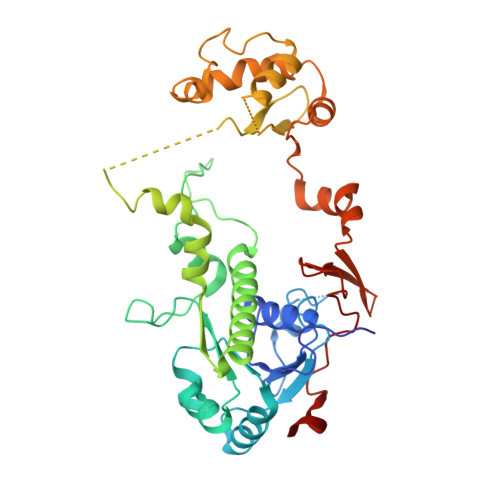Rv3272 encodes a novel Family III CoA transferase that alters the cell wall lipid profile and protects mycobacteria from acidic and oxidative stress.
Karade, S.S., Pandey, S., Ansari, A., Das, S., Tripathi, S., Arora, A., Chopra, S., Pratap, J.V., Dasgupta, A.(2019) Biochim Biophys Acta Proteins Proteom 1867: 317-330
- PubMed: 30342240
- DOI: https://doi.org/10.1016/j.bbapap.2018.10.011
- Primary Citation of Related Structures:
5YIT, 5YIY, 5YX6 - PubMed Abstract:
The availability of complete genome sequence of Mycobacterium tuberculosis has provided an important tool to understand the mycobacterial biology with respect to host-pathogen interaction, which is an unmet need of the hour owing to continuous increasing drug resistance. Hypothetical proteins are often an overlooked pool though half the genome encodes for such proteins of unknown function that could potentially play vital roles in mycobacterial biology. In this context, we report the structural and functional characterization of the hypothetical protein Rv3272. Sequence analysis classifies Rv3272 as a Family III CoA transferase with the classical two domain structure and conserved Aspartate residue (D175). The crystal structure of the wild type protein (2.2 Å) demonstrated the associated inter-locked dimer while that of the D175A mutant co-crystallized with octanoyl-CoA demonstrated relative movement between the two domains. Isothermal titration calorimetry studies indicate that Rv3272 binds to fatty acyl-CoAs of varying carbon chain lengths, with palmitoyl-CoA (C16:0) exhibiting maximum affinity. To determine the functional relevance of Rv3272 in mycobacterial biology, we ectopically expressed Rv3272 in M. smegmatis and assessed that its expression encodes significant alteration in cell surface with marked differences in triacylglycerol accumulation. Additionally, Rv3272 expression protects mycobacteria from acidic, oxidative and antibiotic stress under in vitro conditions. Taken together, these studies indicate a significant role for Rv3272 in host-pathogen interaction.
Organizational Affiliation:
Molecular and Structural Biology Division, CSIR-Central Drug Research Institute, Sector 10, Jankipuram Extension, Sitapur Road, Lucknow 226031, Uttar Pradesh, India.














